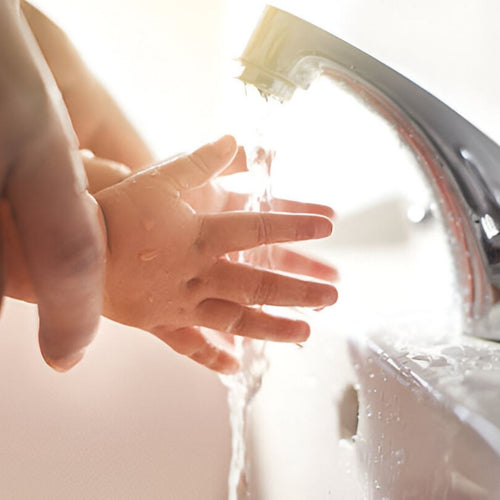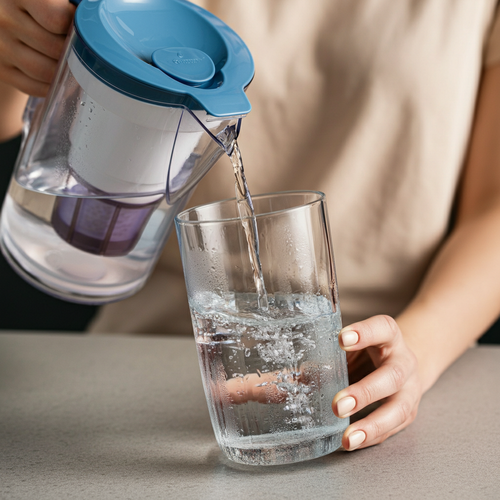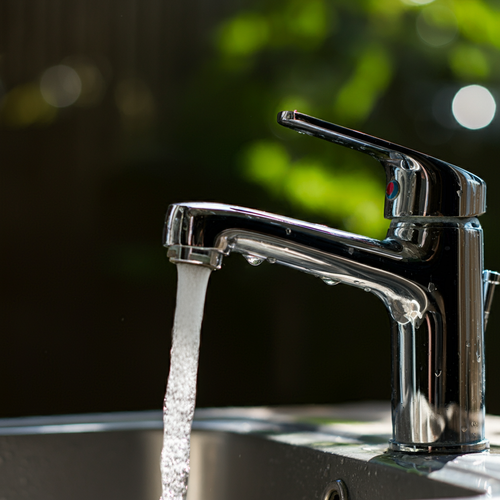Understanding Sulfur Water Smell
Who would've thought that the smell of rotten eggs would be making an appearance in our homes, and not from the kitchen? If your water stinks like this, you're not alone. Many folks with well water are baffled by the mystery odor.
Let’s gab about where this stink comes from and what it means for our health, thanks to its main suspect: hydrogen sulfide.
Causes of Sulfur Smells

What’s that smell, you ask? Usually, it’s driven by sulfur bacteria or hydrogen sulfide gas popping out of nowhere. These tiny critters go bananas over decomposing stuff.
The outcome? Sneaky hydrogen sulfide gas. This lovely mix gets cozy in the pipes, and voila—here comes that rotten egg smell we all "adore."
This gas doesn't discriminate between ZIP codes and might invite guests like iron bacteria over. Trust us, these guys are party crashers, jamming up water wells, water pipes, and sprinklers all around (Minnesota Department of Health).
| Culprit | What’s Going Down |
|---|---|
| Sulfur Bacteria | Party on rotty bits, birthing hydrogen sulfide gas |
| Hydrogen Sulfide Gas | Smells funky; pops up in any well; loves to hang with iron bacteria |
| Other Bacteria (e.g., Iron Bacteria) | Clog the plumbing party when gassed up by hydrogen sulfide |
Health Implications of Hydrogen Sulfide
Sulfur bacteria themselves are like that mildly annoying coworker—they bother you but aren't dangerous. But hydrogen sulfide? That's a different story. Sniffing too much of this could make anyone woozy, with side effects like feeling queasy, having a pounding head, or worse, losing your marbles.
If the gas gangs up in unventilated spots, it might become a real life-sized problem in spaces like well pits or basements.
We can't stress enough the importance of getting ahead of hydrogen sulfide in your water. Dealing with this isn’t a DIY adventure—call in the folks who know their stuff (Minnesota Department of Health).
| Health Complications | Symptoms/Effects |
|---|---|
| High Concentration of Hydrogen Sulfide Gas | Queasiness, headaches, delirium, fits |
| Accumulation in Cramped, Air-free Zones | Risks in well shafts, basements; let the pros handle it |
By piecing together the puzzle of what causes the sulfur stink and how it affects us, we're in a much better position to tackle this all-too-common well water woe.
Solutions for Sulfur Removal
RO Systems & Water Softeners
If your water's got an awful 'rotten egg' tang, we've got your back with Reverse Osmosis (RO) systems and water softeners. These nifty gadgets tackle that stinky sulfur headache and help with that metallic inkling often found in well sources.
Reverse Osmosis Systems
Reverse osmosis (RO) systems are a game-changer for water filtration, offering a reliable way to remove harmful contaminants.
These systems work by forcing water through a fine membrane, leaving behind impurities like heavy metals, bacteria, and dissolved solids.
Installing an RO system under your kitchen sink can transform your drinking and cooking water into a cleaner, safer resource.
If you've ever worried about the quality of your tap water or noticed odd smells, an RO system might be the solution you need.
How RO Systems Work
RO systems use a step-by-step filtration process to purify water. First, pre-filters like sediment and activated carbon filters remove larger particles and chemicals such as chlorine that can affect taste and smell.
Then, the water passes through the RO membrane, which captures even microscopic contaminants. The purified water is stored in a tank for easy access, while waste water containing impurities is flushed away.
Think of it as giving your water a deep clean before it reaches your glass.
Why Choose Reverse Osmosis?
✓ Cleaner, Safer Water: RO systems can eliminate up to 99% of contaminants, including lead, arsenic, and nitrates. This makes them ideal for households concerned about water quality.
✓ Better Taste and Smell: Pairing the system with an activated carbon filter can tackle unpleasant odors like sulfur or chlorine, leaving your water fresh and odor-free.
✓ Protect Your Appliances: By reducing minerals like calcium and magnesium, RO systems help prevent scale buildup in devices like coffee makers, kettles, or even your water heater.
✓ Eco-Friendly Alternative: If you rely on bottled water for drinking or cooking, switching to an RO system can reduce plastic waste and save money over time.
Practical Applications at Home
RO systems fit seamlessly into everyday life:
✓ Drinking Water: Enjoy crystal-clear water straight from the tap without worrying about contaminants or strange smells.
✓ Cooking: Use purified water to enhance the flavor of soups, teas, or pasta dishes. Clean water makes a noticeable difference in food preparation.
✓ Gardening: Sensitive plants thrive when watered with filtered water free from harsh chemicals or excess minerals.
✓ Appliance Care: Protect appliances like humidifiers or irons from mineral deposits by using softened RO-filtered water.
| RO System Feature | Benefit |
|---|---|
| Semi-permeable membrane | Kicks out impurities, sulfur too! |
| Activated carbon filter | Zaps odors, levels up the taste |
Water Softeners
Now, let's talk about tag-teaming RO systems with water softeners. These goodies toss out the highbrow minerals like calcium and magnesium in exchange for sodium or potassium, squashing any clear water iron and kicking that metallic flavor to the curb.
Water softeners are essential for tackling hard water issues in your home. They work by removing minerals like calcium and magnesium, which cause scaling, soap inefficiency, and metallic water smells.
Through a process called ion exchange, these minerals are replaced with sodium or potassium ions, leaving your water softer and more manageable.
When paired with reverse osmosis (RO) systems, water softeners create an unbeatable team for improving water quality throughout your house.
How Water Softeners Work
Water softeners consist of three main components:
✓ Mineral Tank: This is where the hard water flows through resin beads charged with sodium ions. These beads attract and trap calcium and magnesium, releasing sodium ions into the water in return.
✓ Brine Tank: This stores a salt solution used to recharge the resin beads during the regeneration cycle.
✓ Control Valve: It monitors water usage and initiates the regeneration process when needed.
The ion exchange process ensures that hard minerals are removed, preventing scale buildup in pipes, appliances, and your water heater. The result is softer water that’s easier on your plumbing and skin.
Benefits of Water Softeners
✓ Improved Appliance Efficiency: Softened water prevents scale buildup in appliances like dishwashers, washing machines, and water heaters, extending their lifespan and reducing energy costs.
✓ Better Cleaning: Soft water lathers more effectively with soap, making cleaning easier while using less detergent.
✓ Enhanced Taste: By removing metallic-tasting minerals, softened water improves the flavor of drinking water and food preparation.
✓ Reduced Water Smells: Hard minerals can cause unpleasant odors in tap water. A softener eliminates these smells, leaving your water fresh and clean.
Practical Applications at Home
Water softeners improve daily life in several ways:
✓ Cooking: Softened water enhances food flavors by eliminating metallic tastes caused by hard minerals.
✓ Gardening: Plants sensitive to high mineral content thrive better when watered with softened water.
✓ Appliance Care: Your dishwasher and washing machine will last longer without scale buildup from hard water.
| Water Softener Feature | Benefit |
|---|---|
| Ion exchange process | Boot calcium and magnesium |
| Reduces clear water iron | Goodbye metallic taste |
Balancing pH Levels
Next up, pH balancing is key to breaking up with those sulfur smells and scoring top-tier water quality.
Though low pH levels can leave your water acidic, leading to munching away at your pipes and funky metallic notes.
Identifying pH Imbalances
If your water's strutting about with a pH below 7, it’s likely on the acidic side—bad news for your plumbing and taste buds.
| pH Level | Water Condition | Impact |
|---|---|---|
| Below 7 | Acidic | Munches pipes, that yucky taste |
| 7 | Neutral | Drink away without worry |
| Above 7 | Alkaline | Slashes metallic taste and saves pipes |
Alkaline/Remineralizing Filters
Time to fight back those low pH levels by going alkaline. These filters are often the sidekick to a new RO system, bumping your water's pH up to smooth sailing at 9-10.
| Filter Type | Effect |
|---|---|
| Alkaline filter | Cranks up pH levels |
| Remineralizing filter | Sprinkles in good minerals |
By staying clued-up and putting these solutions to the test, we'll leave behind those pesky sulfur smells in our water and toast to a fresh, inviting water supply!
Top Sulfur Filter for Your Home
Tired of that stinky sulfur smell in your water? We've dug through the options and handpicked the top sulfur filters that'll tackle those issues head-on. Let's check out what makes each one a winner.
SoftPro Iron Master
Keeping costs in check while ditching the sulfur smell? The SoftPro Iron Master is your wallet's best friend. It filters out up to 5 ppm of sulfur, plus iron and manganese, without breaking the bank. Perfect for those watching their spending.
| Feature | Details |
|---|---|
| Sulfur Knockout | Up to 5 ppm |
| What Makes It Tick | Budget-friendly filtration |
| Biggest Plus | Affordable fix for sulfur, iron, and manganese woes |
Ditch the smell by grabbing one of these top-notch sulfur filters. They're a game-changer for turning that yucky water into clean, fresh goodness. Enjoy odor-free H2O at home!
Addressing Hydrogen Sulfide Gas
Hydrogen sulfide gas (H₂S) is often the culprit behind that unpleasant rotten egg smell in water. It’s not just a nuisance—it can also corrode plumbing, damage appliances, and affect the taste of food and beverages.
Tackling this issue requires proper testing and treatment to ensure your water is safe and odor-free.
Testing: Identifying the Problem
Before jumping into solutions, it’s crucial to test your water for hydrogen sulfide levels. Professional water testing can determine the concentration of H₂S and identify other potential contaminants like coliform bacteria or nitrates.
If you suspect the smell originates from your water heater, it’s best to call a plumber or water system expert to inspect the tank safely.
Treatment Options: Tailored to Your Needs
✓ Disinfection
If sulfur bacteria are present in your well, plumbing, or water softener system, a strong chlorine wash is an effective solution. This process kills bacteria and neutralizes odors.
Before disinfection, scrub the well casing and apply specialized chemicals if needed. For persistent groundwater contamination, consider installing a home water filtration system or drilling a new well for a cleaner water source.
✓ Filtration Systems: The right filtration system depends on the concentration of hydrogen sulfide gas in your water.
✓ Activated Carbon Filters: Ideal for low levels of H₂S (less than 0.3 ppm). These filters adsorb hydrogen sulfide and improve taste and odor but require regular replacement as they get exhausted quickly.
✓ Oxidizing Filters (e.g., manganese greensand): Effective for moderate levels of H₂S (up to 5–7 ppm). These filters oxidize hydrogen sulfide into solid sulfur particles, which are then trapped and removed during backwashing. Regular regeneration with potassium permanganate is necessary to maintain efficiency.
✓ Oxidation-Filtration Systems: Suitable for high concentrations of H₂S (above 7 ppm). These systems use oxidizing chemicals like chlorine or potassium permanganate followed by filtration to remove sulfur particles. A retention tank ensures adequate contact time for oxidation before filtration.
✓ Aeration Systems: Aeration physically removes hydrogen sulfide by injecting air into the water, allowing the gas to escape. This method works well for low-to-moderate levels of H₂S but may require additional filtration to remove sulfur particles formed during the process. Aeration is chemical-free but can be less effective at higher concentrations.
✓ Drilling a New Well or Alternate Water Source: If all else fails and contamination persists, drilling a new well or switching to an alternate water source might be necessary. This option is often considered when groundwater contamination is severe or untreatable with standard methods.
Practical Applications at Home
✓ Water Heaters: Hydrogen sulfide often forms in water heaters due to sulfate-reducing bacteria reacting with magnesium anodes inside the tank. Replacing the magnesium anode with an aluminum or zinc one can help reduce odors while protecting the heater from corrosion.
✓ Cooking and Food Preparation: Removing hydrogen sulfide ensures better-tasting water for cooking and beverages like tea and coffee.
✓ Gardening: Plants sensitive to sulfur compounds thrive better when watered with treated, odor-free water.
✓ Appliances: Treated water prevents corrosion in dishwashers, washing machines, and other household systems.
Why Treatment Matters
Ignoring hydrogen sulfide can lead to long-term damage to your plumbing system, unpleasant smells in your home, and even health concerns if bacteria are involved.
Proper testing helps pinpoint the source of the problem, while tailored treatments ensure your water is safe for drinking, cooking, watering plants, and daily household use.
By combining effective filtration methods like activated carbon or oxidizing filters with professional maintenance, you can eliminate hydrogen sulfide odors and enjoy fresh-smelling, clean water throughout your home!
| Treatment Option | Hydrogen Sulfide Levels |
|---|---|
| Activated Carbon Filters | Low levels (up to ~2 mg/L) |
| Oxidizing Filters (e.g., Mn Greensand) | Up to 6 mg/L |
| Oxidation-Filtration Systems | Above 6 mg/L |
On-Site Loan Program in Vermont
Folks in Vermont grappling with messed-up water supply systems 'cause of hydrogen sulfide can lean on the On-Site Loan Program. With funding from the Agency of Natural Resources and managed by Opportunities Credit Union, this program brings low-interest loans for fixing or replacing your water and wastewater systems.
- Eligibility: Vermont residents having trouble with their water or wastewater systems.
- Loan Details: Low-interest goodies for repair or replacement tasks.
-
Additional Assistance Programs:
- NeighborWorks Alliance
- Single Family Housing Repair Loans and Grants
These programs are lifelines, helping Vermont folks keep their water supply clean and safe from stinky hydrogen sulfide challenges.


















![Aldex Premium 10% Cross Link Resin for Water Softener [High Capacity]-SoftPro® Water Systems](http://www.softprowatersystems.com/cdn/shop/files/Aldex_10_Cross_Link_Resin_Premium_High_Capacity_for_Water_Softener_600x.jpg?v=1735853599)





















